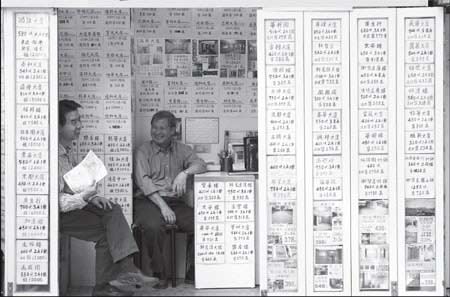New home buy curbs effective in HK
Updated: 2012-10-30 10:45
By Li Tao (China Daily)
|
|||||||||||
|
 |
|
Two men chat inside a real estate agency in Hong Kong. The government's stamp duty measures announced last Friday will contain property prices but there is little room for the price to fall, according to local analysts. Dale de la Rey / Bloomberg |
But there is little room for price to drop as holding power is strong
The Hong Kong government's property measures announced last Friday will effectively contain home prices, but there is little room for price correction, analysts generally believe.
Expecting demand to slump by about 20 percent due to the newly announced heavy-handed measures, Nicole Wong, regional head of property research at CLSA, said she only expects some 1 to 2 percent immediate price drop as there are few sellers now in the market and the impact will be absorbed mainly in the form of slower transaction volume.
The Hong Kong government on Friday unveiled a new round of curbs on the property market, imposing a 10 to 20 percent Special Stamp Duty (SSD) on short term home resales within a three-year period and also slapped an unprecedented 15 percent Buyers' Stamp Duty (BSD) on home buyers who were not permanent Hong Kong residents.
The BSD could play a bigger role as it becomes rather pricey for non-local buyers to purchase homes in Hong Kong, Wong said, adding that given that the mainland buyers' purchasing power are strong and they are capable and can generally hold onto their properties, a dramatic price correction of the property market is also unlikely in the short term, Wong told China Daily in a telephone interview.
Indicating that the upgraded version of the SSD is likely to receive better results this time given a weaker macro backdrop, andthe unexpectedly high BSD on non-local buyers, Hang Seng Bank said in a report on Monday. The report said that the property prices' direction is "still unclear as higher transaction cost may be passed on to the potential buyers, depending on the price sensitivity of both buyers and sellers."
As was seen in Hong Kong, home prices remain on an upward trend after the introduction of the SSD two years ago, said the report. "While the rising trend is likely to be arrested for now as confidence is hit by the new measures, room for correction is expected to be limited as the owners' holding power is still relatively strong given the still low rates of interest," the report said.
Ma Jun, chief China economist for Deutsche Bank AG, said in an email note that the expectation of a likely price decline should keep many genuine buyers (end-users) on the sidelines for a while, and the BSD should deter those speculative buyers immediately.
Data from Centaline Property Agency showed that only 12 second-hand home transactions were registered in 10 key residential estates in Hong Kong over the weekend, down 43 percent from last weekend. Midland Property indicated 52 percent in the transaction volume as it only spotted 11 transactions within its 10 monitored key residential estates.
But Ma also only expects a modest 5 percent price decline in the coming few months, and does not envisage a very sharp decline in prices as supply remains tight relative to end-user demand and as well as the low cost of loans in Hong Kong - which remains a key support for property prices.
"With about 34,600 couples marrying in the first eight months of this year and assuming there are 15,000 public housing units to take care of a portion of these household formations, there are still close to 20,000 units demand in the private sector," Cusson Leung, an analyst of Credit Suisse wrote in a report.
"Assuming there are 13,000 units available for sales next year, there is still a substantial potential shortfall in the private market even without any 'non-resident' or 'investment' demand. It is true that the removal of this extra demand may remove some drivers of the property market, but it would not be the reason for causing property prices to fall," Leung wrote in the report released on Monday.
Charles Chan, managing director of Savills Valuation and Professional Services, told China Daily that near-term home prices are believed to have frozen while the longer-term trend may be still against the government's will.
"If, after careful deliberation and observation, potential home buyers hold that the market is still on an upward trend in Hong Kong, they will anyhow go for it and push the prices to some unexpected higher levels," Chan added.
litao@chinadailyhk.com
Related Stories
Private homes devt hits 7-yr high 2012-10-29 14:03
Moderate pay rises predicted for HK workers 2012-10-26 10:11
Home confidence at 4-year low 2012-10-23 10:53
Capital inflows lift HK dollar vs US dollar 2012-10-22 10:07
New home measures on standby in HK 2012-10-19 10:33
Today's Top News
President Xi confident in recovery from quake
H7N9 update: 104 cases, 21 deaths
Telecom workers restore links
Coal mine blast kills 18 in Jilin
Intl scholarship puts China on the map
More bird flu patients discharged
Gold loses sheen, but still a safe bet
US 'turns blind eye to human rights'
Hot Topics
Lunar probe , China growth forecasts, Emission rules get tougher, China seen through 'colored lens', International board,
Editor's Picks

|

|

|

|

|

|





